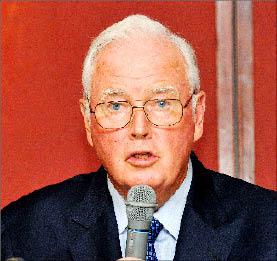The head of an international delegation of electoral observers yesterday said remarks by a visiting former American Institute in Taiwan (AIT) director concerning today’s presidential election were “inexcusable” and were contrary to US commitments to Taiwan’s democracy.
Frank Murkowski, head of the international delegation for the International Committee for Fair Elections in Taiwan (ICFET), called a press conference after former AIT director Douglas Paal strongly endorsed in a TV interview the so-called “1992 consensus” adopted by the Chinese Nationalist Party (KMT), while calling the “Taiwan consensus” proposed by Democratic Progressive Party (DPP) presidential candidate Tsai Ing-wen (蔡英文) “impractical.”
Paal, who was invited by the government-affiliated Prospect Foundation to lead a delegation of monitors, also raised doubts about Tsai’s ability to ensure stability across the Taiwan Strait and insinuated that Washington was apprehensive about a DPP victory in the election.

Photo: Chien Jung-fong, Taipei Times
While describing the democratic process in Taiwan as “orderly” and “energetic,” Murkowski said the past two days had seen the emergence of “surprising activity.”
“I take strong issue with any inference of US policy favoring any candidate or party,” the former US senator told the press conference.
“That is simply not the case,” he said, adding that AIT Director William Stanton had reiterated to him by telephone yesterday that the AIT remained neutral in the election, while US Assistant Secretary of State for East Asia and Pacific Affairs Kurt Campbell has also made comments reaffirming Washington’s neutrality.
Murkowski said the comments by Paal, now vice president for studies at the Carnegie Endowment for International Peace, were his own and that to suggest they reflected Washington’s view was inappropriate.
On Paal’s contention that if Tsai were elected the US would be “massively and quickly engaged to try to help her come to a formula that would preserve [cross-strait] peace and stability,” Murkowski said the remarks were “condescending” and that Tsai was a seasoned politician who was “perfectly capable to find a solution” to relations with Beijing.
Murkowski also dismissed as false Paal’s suggestion that a “leak” to the Financial Times by a senior US official raising concerns about Tsai’s ability to ensure peace across the Strait was a common view in Washington.
“This is editorializing to say the least,” Murkowski said, also taking exception with Paal’s reference to Tsai’s proposed “Taiwan consensus” as “too vague” to make Washington comfortable.
“I can assure you that Washington is never comfortable with anything,” the 78-year-old former senator said.
The “Taiwan consensus” represents an effort by Taiwanese to determine their future by democratic means, he said, adding that while the “1992 consensus” might have made sense in 1992, “things change.”
Paal’s comments were “careless” and “inexcusable,” he said, adding that it “challenges credulity [that Paal would presume] to speak for my government and the vast majority of Americans who have vast admiration for Taiwan’s democracy.”
They could also raise fears among Taiwanese voters over Washington’s commitment to the Taiwan Relations Act or Beijing’s reaction to the vote, he said.
Murkowski reiterated the ICFET’s mandate as an impartial body that does not favor any party or candidate, and raised issues with the delegation led by Paal, saying it was “quite contrary to the mission of a group that does not support any party.

A preclearance service to facilitate entry for people traveling to select airports in Japan would be available from Thursday next week to Feb. 25 at Taiwan Taoyuan International Airport, Taoyuan International Airport Corp (TIAC) said on Tuesday. The service was first made available to Taiwanese travelers throughout the winter vacation of 2024 and during the Lunar New Year holiday. In addition to flights to the Japanese cities of Hakodate, Asahikawa, Akita, Sendai, Niigata, Okayama, Takamatsu, Kumamoto and Kagoshima, the service would be available to travelers to Kobe and Oita. The service can be accessed by passengers of 15 flight routes operated by

Chinese spouse and influencer Guan Guan’s (關關) residency permit has been revoked for repeatedly posting pro-China videos that threaten national security, the National Immigration Agency confirmed today. Guan Guan has said many controversial statements in her videos posted to Douyin (抖音), including “the red flag will soon be painted all over Taiwan” and “Taiwan is an inseparable part of China,” and expressing hope for expedited reunification. The agency last year received multiple reports alleging that Guan Guan had advocated for armed reunification. After verifying the reports, the agency last month issued a notice requiring her to appear and explain her actions. Guan

GIVE AND TAKE: Blood demand continues to rise each year, while fewer young donors are available due to the nation’s falling birthrate, a doctor said Blood donors can redeem points earned from donations to obtain limited edition Formosan black bear travel mugs, the Kaohsiung Blood Center said yesterday, as it announced a goal of stocking 20,000 units of blood prior to the Lunar New Year. The last month of the lunar year is National Blood Donation Month, when local centers seek to stockpile blood for use during the Lunar New Year holiday. The blood demand in southern Taiwan — including Tainan and Kaohsiung, as well as Chiayi, Pingtung, Penghu and Taitung counties — is about 2,000 units per day, the center said. The donation campaign aims to boost

The Central Weather Administration (CWA) said a magnitude 4.9 earthquake that struck off the coast of eastern Taiwan yesterday was an independent event and part of a stress-adjustment process. The earthquake occurred at 4:47pm, with its epicenter at sea about 45.4km south of Yilan County Hall at a depth of 5.9km, the CWA said. The quake's intensity, which gauges the actual effects of a temblor, was highest in several townships in Yilan and neighboring Hualien County, where it measured 4 on Taiwan's seven-tier intensity scale, the CWA said. Lin Po-yu (林柏佑), a division chief at the CWA's Seismological Center, told a news conference